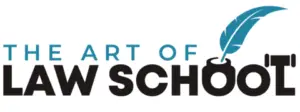Ever been thrown into the deep end, expected to swim or sink? That’s what cold calling in law school feels like.
You’re sitting there, heart pounding as you watch your professor randomly pick a name. “Could be me next,” you think.
The room is silent. Your pulse races faster… Then bam! It’s your turn – and just like that, it’s sink or swim time.
That right there is cold calling; unpredictable, nerve-wracking but an invaluable part of legal education. Why?
In this post we’ll dive deeper (pun intended), shedding light on the benefits such as honing legal analysis skills and boosting public speaking confidence. We’ll share practical tips for preparation and tackling those tricky questions head-on while keeping calm under pressure.
Jump Ahead To:
What is Cold Calling in Law School?

In law school, litigation and trial practice are fundamental skills to acquire and there’s a teaching method that puts these abilities to the test from day one: cold calling.
Cold calling isn’t about selling anything over the phone or making unsolicited contact with strangers. In this context, it refers to a classroom technique where professors randomly select students during class sessions and ask them questions related to assigned readings or case studies.
This practice helps sharpen your legal acumen by putting you on the spot – just like real-world courtroom scenarios. The key here is spontaneity; professors don’t provide advance notice of who they’ll call on next. So, everyone needs to be prepared for their moment under scrutiny.
The Origins of Cold Calling
Ever heard of the Socratic Method? It’s an ancient teaching style adopted by none other than Socrates himself. This strategy involves asking probing questions rather than providing direct answers—pushing learners into deeper analysis and critical thinking.
Navigating Cold Calls as a Law Student
Suddenly being asked complex legal questions can feel intimidating initially—but remember—it’s designed to prepare you for your future legal career. The ability to think on your feet and articulate clear, concise responses is crucial whether you end up practicing as a litigator or a corporate lawyer.
View it as a chance rather than an exam. It’s not about perfect answers; it’s about participating, learning how to respond under pressure, and improving over time.
The Unpredictability Factor
Cold calling creates an atmosphere where every student must be prepared at all times—fostering the habit of being thoroughly prepped for any situation—a trait that’ll serve you well throughout your law career.
So when you’re next in class wondering if today might be the day the professor calls on you – take heart. You’re practicing real-world skills which will set up strong foundations for success.
Benefits of Cold Calling

Cold calling in law school may sound intimidating, but it’s a practice that packs serious benefits. Imagine being able to think on your feet during heated legal debates or confidently addressing the courtroom. This is what cold calling can help you achieve.
Building Legal Analysis Skills
The primary advantage of cold calls is how they help students sharpen their legal analysis skills. It’s like solving puzzles – each question helps unravel complex legal issues and encourages you to view them from multiple perspectives.
You’re not just absorbing information; instead, you’re actively engaging with it. You learn to break down intricate cases into understandable bits and construct logical arguments – essential skills for any aspiring lawyer.
Gaining Confidence in Public Speaking
Fear public speaking? Well, who doesn’t. But guess what? The more frequently you do something, the less scary it becomes. That’s where cold calling shines.
In essence, these classroom exercises are rehearsals for real-world scenarios. As future lawyers, being articulate and confident while presenting arguments before judges or negotiating settlements will be crucial parts of your job profile. By regularly participating in class through cold call discussions, you’ll find yourself becoming increasingly comfortable speaking up publicly – turning stage fright into stage might.
Becoming Comfortable with the Socratic Method
Law school isn’t just about repetition based learning. It’s more like a training ground where you learn to think, argue and analyze – all through the Socratic method. Cold calling is an integral part of this teaching style.
Being cold-called means being on your toes, ready to answer any question that comes your way. This not only helps in developing quick thinking but also familiarizes students with the interactive nature of law practice.
The Socratic dialogue lets you dive deeper into legal principles and case facts – helping enhance your understanding while keeping you actively engaged in the learning process.
Preparing for Cold Calling

To get ready for cold calling, you need to start with reviewing the assigned reading material before class. This might sound like a no-brainer, but it’s crucial not just to skim through your textbooks or case briefs. Instead, try diving deep into understanding the legal concepts and arguments presented.
Taking notes during lectures can be an effective way of capturing key points and insights from your professor’s discourse. But remember: quality trumps quantity here. Focus on noting down significant details rather than trying to jot down everything that is said.
The Art of Note-Taking
A study by Pam Mueller and Daniel Oppenheimer shows that students who write their notes longhand retain more information compared to those who type them out. So when in law school classes, pen and paper could be your best friends. Funny enough, my Contracts professor shared this study with the class at the beginning of the semester. 90% of us proceeded to ignore his advice and play games or shop on our laptops half of the class.
Critical Reading: Your Secret Weapon
In addition, developing critical reading skills can significantly up your game when faced with cold calls at law school. Critical reading necessitates more than just grasping the content; it’s about breaking down, inquiring after, and evaluating the subject at hand.
Wrapping up, gearing up for cold calls mirrors marathon prep: you’ve gotta have grit, grind, and guile – plus a good water bottle (that’s another chat.). The secret? Know your material inside out and be ready to improvise.
Strategies for Answering Questions
Let’s discuss some techniques to help you shine during these moments.
Stay Calm and Focused
Maintaining composure is key when answering questions. Remember that a legal concept test is not about how much you know, but rather an opportunity to expand your knowledge. When asked a question, take a deep breath before responding. This gives your brain extra seconds to process the information and formulate an answer.
Focusing on the question at hand is crucial too. Avoid getting distracted by external factors or worrying about how others might perceive your response.
Explain Your Reasoning
When answering questions during cold calls, explaining your reasoning shows professors that you’ve thought critically about the issue. Law School Toolbox suggests imagining yourself as an attorney arguing before a judge – every statement needs supporting evidence.
Gather Support For Your Answers
Incorporating case facts or principles from readings will lend credibility to your answers. But remember – if you’re unsure about something, don’t bluff. It’s better to ask clarifying questions than to give inaccurate responses based on assumptions.
Acknowledge Different Perspectives
No single correct answer exists in many legal scenarios because different interpretations are possible depending on perspectives. I suggest that you consider these perspectives and acknowledging them during your answers. It shows you can see the bigger picture.
The beauty of law school cold calls is that they prepare you for real-world legal practice where quick thinking, public speaking, and defending arguments are daily occurrences. So next time your professor points to you for an answer, remember these strategies – stay calm, focus on the question at hand, explain your reasoning with supporting evidence from case laws or readings, and acknowledge different viewpoints. You’ll be acing those cold calls before you know it.
How to Handle Mistakes During Cold Calls

Mistakes during cold calls in law school can be daunting, but they’re not the end of the world. Accepting errors as a part of your educational experience is necessary.
Owning Your Mistake
Firstly, own up to it. If you’ve misinterpreted a case or missed a key fact, acknowledge it openly. This shows maturity and respect for the learning process.
Lawyers, after all, need to adapt quickly when things don’t go as planned.
Acknowledge and Learn From It
Your mistake isn’t something that should leave you feeling defeated; rather use this opportunity to learn from it and expand your understanding of complex legal issues.
Remember what SAGE Journals’ research on learning styles reveals: making errors is fundamental to deepening knowledge acquisition because recognizing our mistakes helps us adjust our thinking processes for better future performance.
Bounce Back with Confidence
Cold call blunders may feel embarrassing at first glance but look at them as stepping stones towards building resilience under pressure – a skill every lawyer needs.
Taking these hiccups in stride will help build your confidence over time which is vital when practicing law.
Seek Guidance and Feedback
If you’re uncertain about where you went wrong during a cold call, don’t hesitate to ask your professor for clarification after class. They are there to help guide your learning journey and can provide useful feedback.
Asking for feedback is not only important but it also demonstrates a willingness to learn, which will certainly impress your professors.
A Final Thought
Mistakes aren’t pitfalls; they are opportunities for growth. Take advantage of errors, gain knowledge from them, and become an even more proficient lawyer in the long run.
Tips for Making the Most of Cold Calls
Getting cold called in law school can feel like walking a tightrope. But, much like that daring act, it’s all about balance and preparation. Here are some tips to help you find equilibrium in this challenging situation.
Actively Participate
Don’t wait to be singled out; take the initiative. Actively participating not only prepares you for potential questions but also shows your professors that you’re engaged and ready to learn.
Avoid Hesitation
If asked a question, don’t hesitate too long before answering – even if unsure of your response. Remember: It’s better to attempt an answer than avoid one entirely.
Ask Questions
If something isn’t clear during discussions or while reading materials beforehand, ask. Inquiring minds are well-received in legal education settings as they demonstrate intellectual curiosity.
Analyze Legally
Cold calls often involve hypothetical scenarios requiring analysis using laws or precedents. Use these opportunities to practice legal reasoning skills. This will make real-life applications easier down the line when working on cases.
The Importance of Cold Calling in Law School
There’s more to cold calling than just a sudden, unexpected question from your professor. It’s a tool that molds law students into sharp-minded attorneys. Like a sudden rush of adrenaline when plunging into icy water, cold calling shocks your brain to its highest level.
Cold calling is not simply about putting you on the spot; it serves as an effective way to develop essential critical thinking skills. But why does this method matter so much?
Honing Your Legal Analysis Skills
The primary reason behind cold calls is enhancing legal analysis abilities. When confronted with complex cases or convoluted laws, lawyers need razor-sharp analytical prowess.
A typical day for them involves scrutinizing minute details and finding connections others may miss—similarly to how detectives find clues at crime scenes—and they often have limited time for such deep-dive investigations. So having honed these skills during those unpredictable class sessions can be quite beneficial.
Gaining Confidence & Overcoming Public Speaking Fears
Speaking confidently in front of crowds doesn’t come naturally to everyone. In fact, many people dread public speaking even more than death itself.
Cold calls help overcome this fear by throwing students right into the thick of things—it’s like learning swimming by being thrown into the pool. The initial splash might be shocking but soon enough one learns to swim—or talk confidently under pressure.
Familiarizing with the Socratic Method
Another critical benefit of cold calling is it familiarizes students with the Socratic method, an essential teaching tool in law schools.
This approach involves constant questioning to stimulate critical thinking and illuminate ideas. It’s akin to sculpting—a chunk of marble won’t become a masterpiece without precise, thoughtful chiseling. Likewise, legal concepts don’t solidify without continuous questions and answers.
Cold Calling: An Unexpected Friend?
Think of a cold call like an unexpected rain shower on a sunny day – startling, sure, but it can also be refreshing. By tackling the hurdles of cold calling head-on, you’re paving your way to personal growth.
FAQs in Relation to What is Cold Calling in Law School
What exactly is cold calling in a law school context?
Cold calling in law school refers to a teaching method where professors randomly select students during class sessions to answer questions related to readings or case studies. It’s not about selling or unsolicited contact; it’s about on-the-spot legal analysis.
What are cold calls like in law school?
Cold calls in law school can be intense. Professors randomly pick students to answer questions on the spot about complex legal topics.
What is the purpose of cold calling in law school?
The aim of cold calling is to foster critical thinking, boost public speaking confidence, and get comfortable with Socratic teaching methods.
How can I best prepare for cold calls?
Preparation involves a thorough review of assigned reading materials and class notes. Engage in critical reading to understand underlying concepts, and actively participate in class discussions to familiarize yourself with potential questions.
I’m afraid of public speaking. How can cold calling help me?
Cold calling can act as repeated exposure therapy to public speaking. The more you’re called upon and practice speaking in class, the more comfortable and confident you’ll become in public speaking situations.
Conclusion
So, what is cold calling in law school? It’s a learning tool. An activity to test your readiness.
Cold calls hone your legal analysis skills and boost public speaking confidence. They make the classroom an active, engaging space where critical thinking thrives.
You’ve learned that preparation matters; reviewing readings, taking notes during lectures and practicing out loud helps.
Remember: Keep calm when answering questions. Provide solid reasoning for your answers. Own up to mistakes – they’re stepping stones towards better understanding.
Above all else, embrace the unpredictability of cold calls as opportunities to grow stronger in the face of challenges – just like future courtroom battles await!
